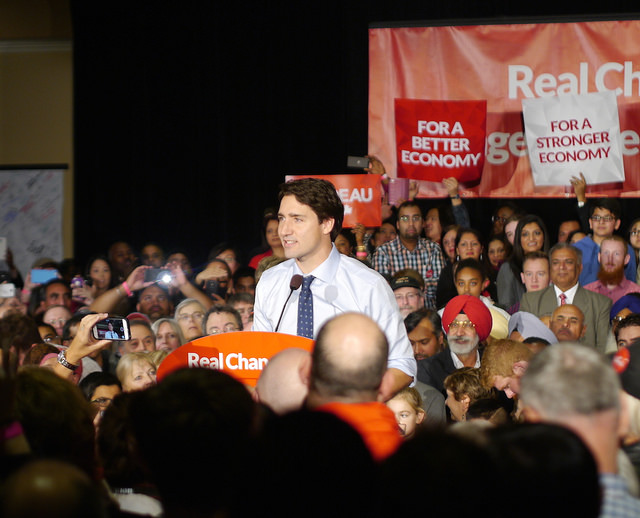rabble is expanding our Parliamentary Bureau and we need your help! Support us on Patreon today!
The 2015 federal election made history in many ways. The resurrection of the Liberal Party from its disastrous showing of 2011 resulted in a sweep of every Atlantic seat and every Toronto seat. The Conservative Party maintained its core vote in most of Canada, while the NDP lost the million votes they added in 2011 and many exceptional Members of Parliament. Nearly three million more people came out to vote, raising the turnout to 69 per cent. All were motivated by the urgency of change.
The labour movement worked for two years on a country-wide Better Choice campaign. Millions of pieces of material, digital outreach, activist training and canvassing were all features of one of the most extensive labour campaigns in our history. This tremendous effort combined with the campaigns of many civil society groups helped defeat the regime of Stephen Harper.
Unfortunately, the NDP lost out in the contest to be the change agent. The image projected by the brilliant Trudeau election team prevailed. And so we have a new majority government with an impressive list of promises to keep in the coming months, but deep ties to Bay Street and corporate Canada.
The Conservatives reached into the gutter to use Islamophobia to whip up their base. Fortunately many others spoke out to challenge this dangerous tactic. From opposition politicians to the United Church and the labour movement, voices were raised to condemn the attempt to divide people by race or religion. But many others stayed discreetly silent, and 5.6 million people still voted for the Conservatives. We need to have an honest, perhaps difficult, conversation about that.
There was a bitter outcome in Toronto as seven NDP Members of Parliament were defeated by the Liberal momentum. Downtown MPs garnered almost the same number of votes as the 2011 election, but the Liberal vote increased by 8-13,000 in each riding. Across the country the NDP caucus was reduced to less than half of its previous size.
There are many theories about the NDP’s fall from front-runner to third party, losing seats across the country. In Quebec the Bloc TV attack ads targeting the NDP were shamefully xenophobic, but at the same time the NDP deficit language reminded many Quebec workers of Premier Couillard’s austerity crusade.
Mulcair made the usual mistake of front-runners by playing it safe, adopting increasingly centrist policies and language as the campaign evolved. Many observers identify Mulcair’s embrace of a “no deficit” mantra as the turning point, when the Liberals pivoted on the issue to come out ahead as the agent of change. From that moment, Trudeau’s message channeled the hope and optimism that was Jack Layton’s brand in 2011, and that approach evolved into a perfect storm of success.
The Liberals were able to dodge key questions such as the nature of the Trans-Pacific Partnership (TPP) which will devastate jobs in the auto parts sector and lock in even more corporate privilege in the global economy.
Trudeau wants the Keystone pipeline approved, which would work diametrically opposite to his stated goals on climate change. On the other hand, this will be an activist government on many key issues, and it will be important to engage the Liberals on how their more progressive promises will be realized.
Thousands of union and social justice activists got involved in the 2015 election, and helped make sure that Stephen Harper was defeated. We express our gratitude to every one of them, and to those who have spent the last decade fighting to resist the mean-spirited and destructive agenda of the Conservatives.
We should celebrate that victory, and then roll up our sleeves to continue to fight for a truly just society in the future.
rabble is expanding our Parliamentary Bureau and we need your help! Support us on Patreon today!
Image: Flickr/rabbleca



